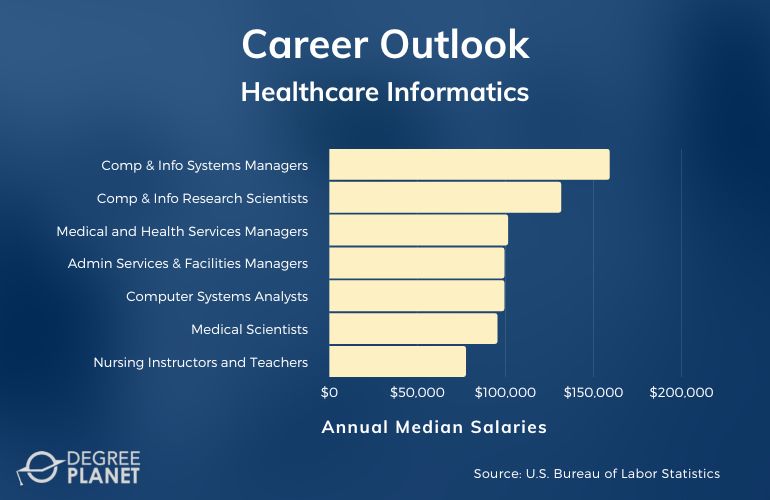Compared to many degree programs, a PhD in Health Informatics is a much newer field of study. While the term has only recently been coined, though, the concept has been around for a long time.

With the widespread use of technology in medical fields, many students are opting to earn a health informatics doctorate to help them contribute to patient care from a systems perspective.
Editorial Listing ShortCode:
If you’re interested in both the medical field and information technology, it may be time to investigate whether an online PhD program in health informatics is right for you!
Online PhD in Health Informatics Programs

Going to the doctor’s office is different today than it was many years ago. Thanks to developments in technology, our medical records are now electronically filed. That means there are many systems in place to help keep these records safe and accurate.
Earning a Ph.D. in Health Informatics can give you the opportunity to learn how these systems work, as well as how to support them. Software programs must be able to store different types of files and meet stringent privacy regulations, all while being shareable between providers.
Editorial Listing ShortCode:
If you choose to pursue one of the online PhD programs in health informatics, you will have the opportunity to develop a variety of skills. These commonly include:
- How various forms of technology connect with each other
- Data analytics
- Clinical data maintenance
- Scanning and imaging technology
- Security requirements as specified by the Health Insurance Portability and Accountability Act (HIPAA)
Though professionals in the field of healthcare informatics don’t necessarily work with patients directly, their knowledge of biomedicine can be vital to the medical field. It can help them support doctors, nurses, and patients who make use of medical technology.
As a result, professionals in this field are in demand to help develop new technology as well as support and enhance existing technology to ensure patients receive the best care possible.
Healthcare Informatics Careers & Salaries

Students who graduate from online PhD programs in health informatics often pursue careers in medical and healthcare services.
Instead of working as doctors or nurses, though, they are responsible for creating, maintaining, and operating the technology used to care for patients. Professionals in healthcare informatics may be employed by hospitals, healthcare centers, research institutes, or clinics. Some help to develop software for the medical field. Others select teaching roles upon graduation.
According to the Bureau of Labor Statistics, the availability of careers in medical and health services management is anticipated to grow by up to 28% in the next ten years. This is faster than average for many careers.
| Careers | Annual Median Salaries |
| Computer and Information Systems Managers | $159,010 |
| Computer and Information Research Scientists | $131,490 |
| Medical and Health Services Managers | $101,340 |
| Administrative Services and Facilities Managers | $99,290 |
| Computer Systems Analysts | $99,270 |
| Medical Scientists | $95,310 |
| Nursing Instructors and Teachers, Postsecondary | $77,440 |
| Social and Community Service Managers | $74,000 |
| Health Information Technologists and Medical Registrars | $55,560 |
| Medical Records Specialists | $46,660 |
Because health informatics combines detailed knowledge of medicine, healthcare science, and information technology, some roles may be classified as IT or computer jobs.
Editorial Listing ShortCode:
In some cases, health informatics professionals may be employed directly by medical facilities to help coordinate their onsite technology and record keeping systems.
Health Informatics PhD Curriculum & Courses

The courses offered in a healthcare informatics doctorate program will differ from school to school, but there are classes that are commonly taught in most programs.
Some of the classes you may take in your program include:
- Human Biomedicine: In this course, you’ll review the healthcare process, including treatment paths and diagnostic opportunities.
- Clinical Database Design: This course teaches how to create and implement databases suitable for clinical record keeping.
- Data Warehouse Development: This class teaches how to create a safe and secure system of storage for information, which is especially important for the storage of medical records.
- Quality Control in the Healthcare Setting: This course can help you learn how to gauge the quality and operability of new technology.
- Biomedical Data Keeping: This course explores the types of records that must be kept in healthcare and who may access these records.
- Understanding Public Health: From epidemiology to understanding cultural differences, this course provides insight into what to expect in the field of healthcare.
- Data Mining in Healthcare: This course provides understanding of how to analyze the data accumulated in healthcare technological systems, which can potentially lead to more medical insight.
- Genetics and the Human Genome: This course explains the link between genetic information and possible medical conditions, which is frequently researched through modern technology.
- Biomedical Terminology: This class teaches the terms and abbreviations used by health informatics professionals.
- Healthcare Research Technology: This course focuses on the types of technology used when conducting research in the health field.
These are just some of the classes that may be offered in your program. You may also wish to tailor your education to best suit your future career goals. Since health informatics combines an understanding of both medical and computer sciences, many schools offer courses that can help bridge any potential gaps that students may have.
Admissions Requirements

Each school can set their own admissions requirements, which means different schools may request their own unique set of information from applicants.
Some common admissions requirements include:
- GRE or GMAT scores (only some schools require them)
- Transcripts from prior education
- Letters of recommendation
- Professional resume
- Statement of intention
Some schools may ask you to participate in an interview with admissions staff as part of the application. Additionally, you may be asked to provide a research plan for your doctoral thesis if your program requires the completion of one.
Finally, having advanced knowledge and skills in the field is often beneficial to applicants to doctoral programs, making having earned a masters in health informatics worth it for many students, but often not required.
Accreditation

When browsing online PhD programs in health informatics, it’s a good idea to pay particular attention to schools that are accredited by the Council of Higher Education (CHEA).
Editorial Listing ShortCode:
To earn CHEA accreditation, schools must demonstrate that their degree programs meet stringent educational standards. As a result, many employers look for applicants who have received their education from accredited schools. Additionally, many professional organizations also look for members who have attended accredited schools.
Financial Aid and Scholarships

For students who need assistance in paying for their health informatics doctorate degree, there are a few options to consider.
Completing the FAFSA, or Free Application for Federal Student Aid, is the first step towards gaining access to federal funds intended for continuing education. Additionally, the school you choose to attend may offer scholarships or grants for doctoral students in the field of health informatics. Each school will be able to share details regarding financial aid.
Your employer may also offer educational assistance or tuition reimbursement. You may also wish to connect with your community or professional groups that offer scholarships too.
What Can You Do with a Doctorate In Health Informatics?

A health informatics doctorate combines the skills practiced by both medical and IT professionals. Graduates of online PhD programs in health informatics often have many career paths open to them.
Technology has become increasingly prevalent in the fields of healthcare and medical research. Because of this, according to the Bureau of Labor Statistics, roles in medical and health services management are expected to increase rapidly in the next 10 years.
Earning your doctorate in health informatics can be a great opportunity for expanding your career options. You may choose to work directly in systems for a healthcare facility or in research and development.
How Long Does It Take to Get a PhD in Health Informatics Online?

The length of time it takes to earn your degree in a health informatics doctoral program depends on the program you select.
A PhD program can usually be completed in 3 to 5 years, but this is contingent on the number of credit hours required by the program. You may also be asked to complete a dissertation, which typically requires intense research that is completed over the course of study.
Editorial Listing ShortCode:
If you select a program that does not require a dissertation for graduation, you may be able to earn your PhD in Health Informatics in just 3 years of full-time study.
What’s the Difference between a PhD in Health Information Management vs. Health Informatics?
There are many commonalities between a PhD in health information management and health informatics doctoral programs, but there are also some differences.
Typically, a health information management program focuses on:
- Data storage technology
- Patient data security
- Managing and developing record-keeping technology
On the other hand, a health informatics doctoral program usually focuses on:
- Patient care technology
- Research and data analytics
- Diagnostic tools and analytics
Health information is a field that impacts many individuals. It involves the development of technology that helps patients track their health and software that can create diagnosis and treatment programs.
Is a PhD in Health Informatics Worth it?

Yes, a PhD in Health Informatics is worth it for many students. Health informatics doctoral programs have been introduced in recent years to help accommodate the growing use of technology in the medical and healthcare fields.
Editorial Listing ShortCode:
As a professional in these fields, earning your PhD in health informatics can help you provide services to patients and doctors alike. While you may never meet the patients impacted by your work, the technology in this field can help keep them healthy and even save lives.
Universities Offering Online Doctorate in Health Informatics Degree Program
Methodology: The following school list is in alphabetical order. To be included, a college or university must be regionally accredited and offer degree programs online or in a hybrid format.

Students at Bay Path University can earn a DHSc with a concentration in Health Informatics Management entirely online. The program requires the completion of 48 credit hours, which are earned through 12 core courses and 4 elective courses. Courses are offered in the fall, spring, and summer.
Bay Path University is accredited by the New England Commission of Higher Education.

Colorado Technical University offers a Doctorate in Healthcare Management and Leadership. The program is mostly online but does have a required residency component. To graduate, students must complete 100 credit hours. A thesis is required and built into the courses. Classes start at multiple times throughout the year. Students can choose concentrations like Informatics or Health Policy.
Colorado Technical University is accredited by the Higher Learning Commission.

Students at Liberty University can earn a Doctorate in Healthcare Administration (DBA). The program is offered entirely online. To graduate, students must complete 60 credit hours. Each course is 8 weeks long, and students can potentially complete the program in just 3 years. The program is vocational and aims to prepare students for careers in the healthcare industry.
Liberty University is accredited by the Southern Association of Colleges and Schools Commission on Colleges.

Post University offers a Doctorate of Nursing Practice—Informatics Leadership Specialization. This program is offered completely online. It has start dates every other month and can potentially be completed in 28 months. To graduate, students are required to complete 42 credit hours in core curriculum and elective courses. A culminating, research-based project is also required.
Post University is accredited by the New England Commission of Higher Education.

Students at Rutgers University can earn a Doctor of Health Informatics degree. The program is offered on campus and fully online. It can typically be completed in 3 to 4 years based on whether students take two or three courses per semester. To graduate, students must complete 54 credits. The program offers three specializations to choose from.
Rutgers is accredited by the Middle States Commission on Higher Education.

The University of Central Florida offers an Online Nursing Practice DNP, Advanced Track program. Each term is 16 weeks long. To graduate, students must complete 42 credit hours. They must also complete a DNP culminating project and log 1000 post-baccalaureate clinical hours. The curriculum consists of courses such as Nursing Environment Management, Healthcare Systems and Policy, and Epidemiology Principles.
The University of Central Florida is accredited by the Southern Association of Colleges and Schools Commission on Colleges.

Students at the University of Illinois—Chicago can earn a PhD in Biomedical and Health Informatics. The program is a combination of on-campus, online, and hybrid courses. To graduate, students must complete 96 credit hours, which usually takes at least 3 years to complete. The program also requires the completion of at least 40 hours of research.
The University of Illinois – Chicago is accredited by the Higher Learning Commission.

The University of Minnesota offers a DNP in Nursing Informatics. To graduate, students must complete 67 credit hours. The program is mostly online, but students must come to campus once per semester for a 4 day session. Students must also complete 1000 hours at practicum sites designed by U of M. The program usually takes 3 years to complete.
The University of Minnesota is accredited by the Higher Learning Commission.

Students at the University of South Alabama can earn a DNP in Nursing Informatics. Students are not required to take a certification exam or complete a thesis but must complete a research-based project. The program requires the completion of 64 credit hours. Courses include Health Data Security and Computers, Healthcare Policy and Finance, and Informatics Residency.
The University of South Alabama is accredited by the Southern Association of Colleges and Schools Commission on Colleges.

Students can earn a Doctorate in Health Informatics at the University of Texas Health Science Center at Houston. To graduate, students must complete 63 credit hours, including a fellowship in health informatics. The program allows one cohort per year, starting in the fall. Students without an MSN in Health Informatics must complete an additional 33 hours.
UTHealth is accredited by the Southern Association of Colleges and Schools Commission on Colleges.
Getting Your PhD in Health Informatics Online

Whether you are currently working in IT or in a medical field, getting your PhD in health informatics online can be an exciting step towards advancing your career.
Technology is a large part of our lives, including our overall health and wellness. From keeping records that can be safely shared between providers and patients to developing technology that can monitor conditions, health information technology is an expansive field, and this online health information management degree may be worth exploring in detail.
If you are ready to become an important part of the medical field, you can start by researching the health informatics doctorate degree programs offered online.

